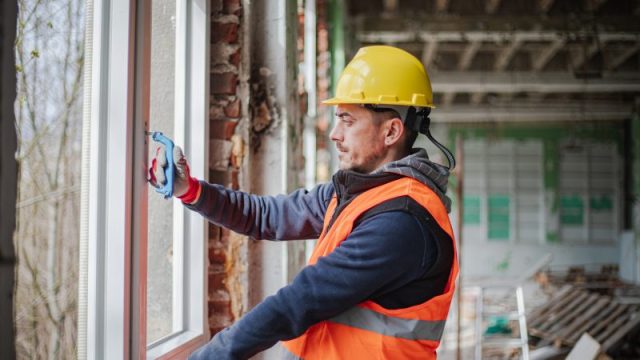Germany’s focus on reducing building energy consumption has failed, representatives of corporate and public landlords said at an event in Berlin on Tuesday (19 November) as ministers turn against each other in the upcoming election campaign.
Germany is heading for snap elections on 23 February, as the former coalition government of Social Democrats (SPD, S&D), Greens and pro-market liberals (FDP, Renew) collapsed earlier this month.
Ahead of the hot phase of the election campaign, a coalition of corporate landlords and researchers has urged a policy change regarding the decarbonisation of buildings, while the Social Democrat’s housing minister blames the Greens for increasing the transition costs.
“Climate protection in existing buildings, as we are currently doing it, is a ‘mission impossible’,” Axel Gedaschko, president of the German Association of Housing and Property Companies (GdW), said at an industry event on Tuesday.
This was because of “a dogmatic, almost creed-like focus on absolute energy savings in individual buildings,” he said, adding that “anyone who is not completely blind will recognise that the historical focus […] on energy savings has simply failed.”
In particular, the renovation rate of buildings is “stuck at just 0.7% for years,” he said, less than half of what would be required to meet the government’s targets. That was despite subsidies of €18 billion every year for building renovation.
“Does anyone seriously believe that we will more than double the renovation rate and then also receive the necessary subsidies?” he asked, citing the already tight government budget and a potential need to double public support.
Finally, despite all efforts to invest in the insulation of existing homes and strict energy efficiency standards for new buildings, “the specific energy consumption [per square metre] has hardly been reduced over the last ten years,” he said, calling it a “first-class fiasco.”
Therefore, Gedaschko called for a focus on “climate efficiency instead of energy efficiency”, whereby building owners would have to follow a CO2 reduction path but would be left with multiple options to do so, including decarbonising the heat supply, renovation of worst-performing buildings, or digital control technology.
This was echoed by a GDW-backed initiative by five researchers, which is calling for “moderate renovation instead of costly, excessive renovation depths” and a “rapid” replacement of fossil fuels with heat pumps or other climate-friendly options, even in unrenovated buildings.
“There is no reason to continue installing gas boilers,” Elisabeth Endres, professor for architecture at Technical University Braunschweig and coordinator of the initiative, told the conference, adding that “we can decarbonise first and then renovate moderately.”
Social Democrat pits energy efficiency against affordability
Social Democratic construction and housing minister Klara Geywitz, a close ally of incumbent chancellor Olaf Scholz, said that during the three years of her term, she had constantly “spoken out against rigid individual renovation targets”.
“The decarbonisation of the heat supply [is] more important than an unaffordable general renovation obligation,” she said.
“The fundamental conflict was between the economy ministry’s focus on energy efficiency and the affordability of construction,” she said, blaming her government colleague Robert Habeck, who was nominated as the Greens’ candidate for chancellor this weekend.
Habeck, who initially wanted to attend the event himself but had to cancel at the last minute to stay longer at the COP29 climate summit in Baku, was represented by newly appointed state secretary Bernhard Kluttig.
“The new government – however it may look – will have to deal with these problems and find solutions,” Kluttig said, citing the need to simplify building law and the EU’s Green Taxonomy.
In the EU taxonomy, “only renovation to the best efficiency class is rewarded,” Kluttig said.
“This means that the most efficient type of renovation, the renovation of particularly inefficient buildings, is practically not recognised or even penalised by the taxonomy,” he added.
[Edited by Donagh Cagney/Alice Taylor-Braçe]





